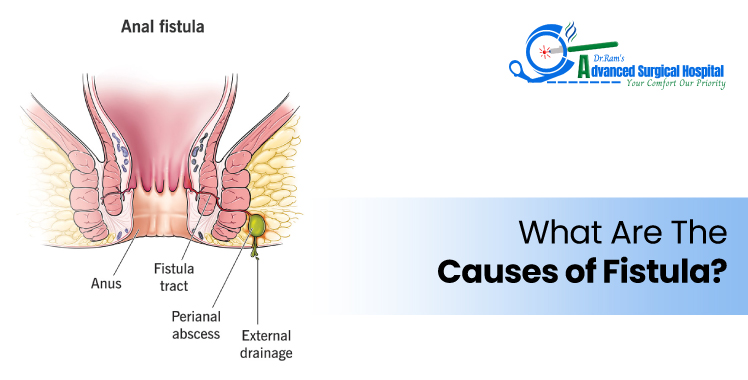What Are the Causes of Fistula?

If you have come to this blog by searching for the causes of fistula! Then you might be suffering from it or someone close to you. So, the good thing is you have come to the right place, as you will have complete details on the causes of fistula, and if you want Fistula Treatment in Ahmedabad, then visit Dr Ram’s Advanced Surgical Hospital. Now, before further delay, let’s start our journey to know about fistula and its causes.
What even is a fistula?
In the simplest terms, a fistula is an abnormal tunnel or connection between two parts of your body that aren’t supposed to be connected. It can happen between organs, between an organ and the skin, or even between different parts of the intestine. Sounds weird, right? But it happens more often than you'd think.
Now, let’s get to the root of it: the causes of fistula, because understanding how this thing even happens is the first step in figuring out how to deal with it.
1. Infections That Just Won’t Quit
One of the most common causes of fistula is an infection that goes deeper than it should. Take an anal abscess, for example. If you get an infection near your rectum and it forms a pus-filled lump, it can eventually eat its way through the tissue and create a channel—yes, that’s your fistula. If it doesn’t heal properly or keeps coming back, there’s a good chance you’re dealing with one.
This is especially common with untreated or delayed infections. And just to clear the air—no, it’s not always about poor hygiene. Sometimes, your body’s immune response just doesn’t kick in the way it should, or the infection hides deep where it’s hard to reach.
2. Surgery Side Effects
Yes, sometimes surgery meant to help you can leave behind unexpected side effects. Post-surgical complications are sneaky causes of fistula. After certain procedures, especially those involving the abdomen or pelvic area, scar tissue or improper healing can create pathways between organs.
For instance, someone who’s had surgery for diverticulitis or gynaecological procedures might notice symptoms weeks or months later, only to find out a fistula formed during recovery. It doesn’t mean anything went “wrong,” but it does mean you’ll need further treatment.
3. Injury or Trauma
Let’s say you had a serious accident, like a car crash, or even something as complicated as childbirth complications. Physical trauma to the pelvic area or lower abdomen can mess with the tissue and result in, you guessed it, a fistula.
While not the most common cause, trauma still makes the list of causes of fistula, especially in developing countries where medical interventions might be limited during childbirth.
4. Cancer and Radiation
Certain cancers, especially colorectal or cervical, can also be behind fistula formation. Sometimes, it’s the tumour itself causing tissue breakdown, and sometimes, it's the treatment, like radiation therapy. Radiation can damage the healthy tissue around the targeted area and eventually lead to abnormal openings or connections.
So yes, both cancer and its treatments are part of the less-talked-about causes of fistula that doctors keep an eye on.
5. Tuberculosis and Other Rare Infections
This might sound old-school, but TB isn’t gone, especially in certain parts of the world. Tuberculosis can cause internal damage that leads to fistula formation, especially in areas like the intestines or the lungs. Other rare infections, like actinomycosis, can also cause similar issues.
While they’re not everyday causes of fistula, they still deserve a mention, especially if someone’s symptoms aren’t adding up with more common conditions.
Wrapping It Up
So, what are the causes of fistula? Infections, chronic diseases, surgery, trauma, and even rare infections or cancer can all play a role. The tricky part is that fistulas can show up in different forms, from rectal to vaginal to intestinal, depending on where and why they form.
If something doesn’t feel right in your body, especially if you're noticing unusual discharge, pain, or recurring infections, it’s always a good idea to check in with a healthcare provider at Dr Ram’s Advanced Surgical Hospital.
And hey, if you’ve made it this far through a blog on fistulas, props to you. It’s not the flashiest topic, but it’s a real one, and being informed is always the first step to feeling better.
